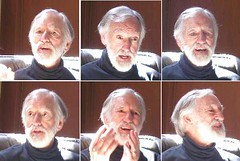Tuesday, July 05, 2005

Bill Veltrop, PathFinders, Soquel, California
Self Portrait at Collective Wisdom Initiative
The Infinite Games
What Are Infinite Games?
James Carse, in his wonderful book, Finite and Infinite Games, suggests:
There are at least two kinds of games.
One could be called finite, the other infinite.
The finite game is played for the purpose of winning,
an infinite game for the purpose of continuing the play,
...and bringing as many persons as possible into the play.
Finite players play within boundaries;
infinite players play with boundaries.
Distinguishing finite from infinite games using business as an example
The purpose of business is to make a profit.- The purpose of business is to generate true wealth for all stakeholder groups.
- Excellent triple bottom line (People, Planet and Profit) performance is essential to ensure both organizational and global sustainability. Two out of three aren't enough.
- Our mission is to be the best for the world.
- Design for distributed resilient operational capacities, for excellence in all domains of performance, and for developing leadership's capacity to create a sustainable future—for our organization and for the larger whole.
- Connect, collaborate, co-create and co-evolve.
- CSR, when approached creatively and proactively, can become a foundational ROI initiative—corporate social opportunity.
- Effective leaders create a context where leadership is widely distributed, where motivation is intrinsic in the work design, and where performance development is woven into the fabric of daily operations.
If any of this whets your appetite, check out the Palette of Possibilities, which includes all of the lenses and a process for applying them. The Design Principles for Generative Initiatives looks good -- "Wholeness is contagious. Be a carrier."
The Dis-tinc-tion-ar-y is a toolbox of metaphors, concepts, and catalysts to help you work with the notions above. I've got to update my Glossary here at Internet Time.
I had the pleasure of spending the better part of a day with Bill and a group of friends.
"Look back on the present from the future. There's power in standing in a different place."
Intentionality + imagination = the capacity to be your essence. High time to name and give voice to collective essence and accelerate conscious evolution.
Consequences.
Bill's work resonates beautifully with my worldview.
I'm a tremendous fan of Marty Seligman's positive psychology movement. Instead of studying the sick and learning to bring them up to normal, study the healthy and help them surpass themselves. David Cooperider's Appreciative Inquiry takes the positive approach to organizations. Don't start with problems, for that limits your perspective to solutions. You can do better. Tell stories about successes and opportunities.
When I was depressed, and that encompasses several decades of my life, I lapsed into what Marty calls "Learned Helplessness." I knew things would not turn out well, so I held back on trying. It's a self-fulfilling prophesy. If you expect crap, that's what you'll find. Now that the veil of depression has lifted, I'm optimistic about the world and my place in it. Trite though it sounds, the Army's copywriter was on target with "Be all that you can be."









1 Comments:
Jay - thanks for posting this. I just loved the quote from James Carse's book, and will need to read through Bill's site in more detail. I wrote about your post @ http://idea-blog.blogspot.com/2005/07/infinite-games.html
Post a Comment
<< Home